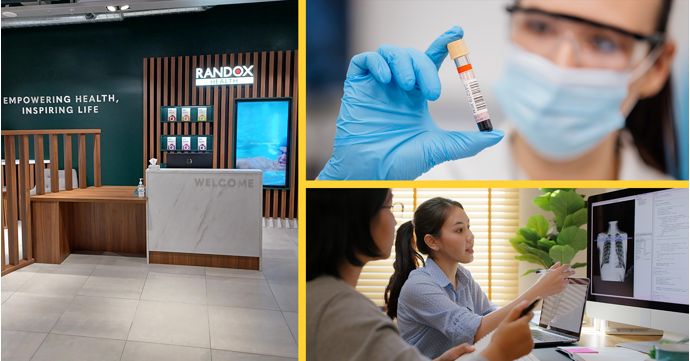Randox Health reports that, on estimate, the average person spends 20 years in poor health — so it's on a mission is to empower people to take control of their health through early detection and proactive management, via preventative health screenings.
SoGlos speaks to research and development scientist at Randox Health, Dr Laura Mooney, to find out more about how its innovative technology can help Gloucestershire people live longer, healthier lives.
Can you briefly explain what preventative healthcare is and why it's becoming more important in today's healthcare landscape?
We'd go as far as saying preventative healthcare is vital to people's long-term health and wellbeing. It aims to identify and treat disease early, while proactively managing risk factors that could contribute to poor health in the future.
The ability to do this is immensely powerful, as it gives us an opportunity to adopt lifestyle changes or begin treatments that could slow or stop disease progression or, in some cases, prevent disease developing.
We're living longer but longevity doesn't always mean good health and chronic diseases, such as heart disease and diabetes are becoming increasingly more common, putting huge pressure on healthcare services — and many cases are preventable.
Randox Health is known for its diagnostic and screening services. How do your health screening packages contribute to early disease detection and prevention?
We believe that access to health data is key to early diagnosis and prevention. Regular monitoring of health data can help us to educate ourselves about the effects our diet, lifestyle and genetics are having on our bodies and identify areas for improvement.
Our range of packages, such as our Everyman, Everywoman and Signature health programmes, provide detailed insights across several health areas.
Our service is designed to encourage a proactive approach
to health, whereby understanding health data provides motivation to adopt
health-promoting diet and lifestyle changes, and to seek advice regarding
supplementation or treatment, where necessary.
What are some of the most common health conditions that can be effectively managed or prevented through early screenings?
Early detection and risk profiling can help manage or prevent several common health issues, from nutritional deficiencies, hormone imbalance, type 2 diabetes, fatty liver disease, chronic kidney disease, heart disease, stroke and some types of cancer.
A less well-known, yet common condition that also benefits from early detection, is haemochromatosis, an inherited condition that causes the body to absorb too much iron.
Excess iron is toxic to the body and can cause liver
disease, arthritis, diabetes, heart problems and fertility problems. However,
early detection and treatment can prevent significant iron overload from
developing, and treatment is as simple as giving blood; a person with iron
overload regularly donates blood until iron levels normalise.
What are some of the key biomarkers that Randox Health screens for and how do these provide insight into a person's health?
Randox Health tests for hundreds of biomarkers, combining results to create unique and detailed health profiles.
We include biomarkers to assess risk of heart disease and diabetes, through to investigation of kidney function, liver function, thyroid function, nutrition, hormones, gut health and more.
We routinely run
novel markers of disease and disease risk, too. For example, within our Heart Health
panel, in addition to traditional cholesterol measurements, we also incorporate
newer, more modern tests, such as apolipoprotein B and lipoprotein (a), which
are stronger predictors of heart disease risk than cholesterol alone.
Are there any recent technology innovations that are particularly exciting?
Technology is the cornerstone of diagnostics. From biomarker identification, test development, analysis and reporting, technology drives the innovations that enable fast, efficient and accurate diagnosis.
Central to the diagnostic capabilities of Randox Health is biochip technology, a Randox-patented testing platform that enables several tests to be run simultaneously from a single sample.
Biochip provides a wealth of testing possibilities, from fertility
concerns to cancer risk, infectious diseases and beyond. For example, Randox
Health offers a UTI biochip test that not only identifies the cause of
infection but also detects antibiotic resistance markers to minimise
unnecessary and ineffective antibiotic prescribing.
Can you provide any examples of how early detection through screenings has helped patients avoid more serious health issues down the line?
We regularly see clients at increased risk of diabetes, heart disease and fatty liver disease, and this information is often the motivation needed to make positive lifestyle change.
Indeed, many of our clients show great improvements with repeat testing. We have helped identify cases of coeliac disease, iron overload, polycystic ovary syndrome and thyroid dysfunction, to name a few.
These conditions can significantly impact quality of life if left unmanaged. Symptoms can include fatigue, depression, anxiety, difficulty managing weight, digestive complaints, fertility issues, as well as leading to other health issues, such as liver disease, arthritis and diabetes.
Identifying and managing these
conditions early, reduces the risk of future complications.
As we look to the future, how do you see the role of preventative healthcare evolving in the next decade?
As we now know, the UK government is aiming to introduce ‘three big shifts’ in reshaping the NHS:
- Transforming from analogue to digital
- Shifting focus from hospitals to the community
- Moving from sickness to prevention
The Randox Health concept, which we have been developing over the last 15 years, aligns perfectly with these shifts, with better access to health testing and early diagnosis, earlier and often less expensive treatment becomes possible, promoting both prevention and health within the community.
This will also create savings within healthcare budgets and improve the nation’s health and productivity. Our focus on comprehensive health profiling, rather than testing based on symptoms alone, is much more powerful for identifying early and asymptomatic conditions.
In addition, we continue to commit considerable resources to research and development to improve the capability of our tests across a wide range of health issues.
What challenges still need to be addressed before preventative healthcare and screenings can be fully integrated into mainstream healthcare systems?
It is clear that prevention is the way ahead, if mainstream healthcare is to be sustainable. To achieve that, there needs to be greater access to blood based diagnostics within the community.
There also needs to be alignment across healthcare services to integrate comprehensive health data into personal medical records, and to provide analysis and direction to patients. Randox Health is advanced in these processes, which can be further enhanced by increased levels of automation and the deployment of AI systems.
Those interested in the Randox Health preventative screening services can get an exclusive 10 per cent off by using the code 'SoGlos' when booking at the Cheltenham clinic, located at John Lewis Cheltenham.



















